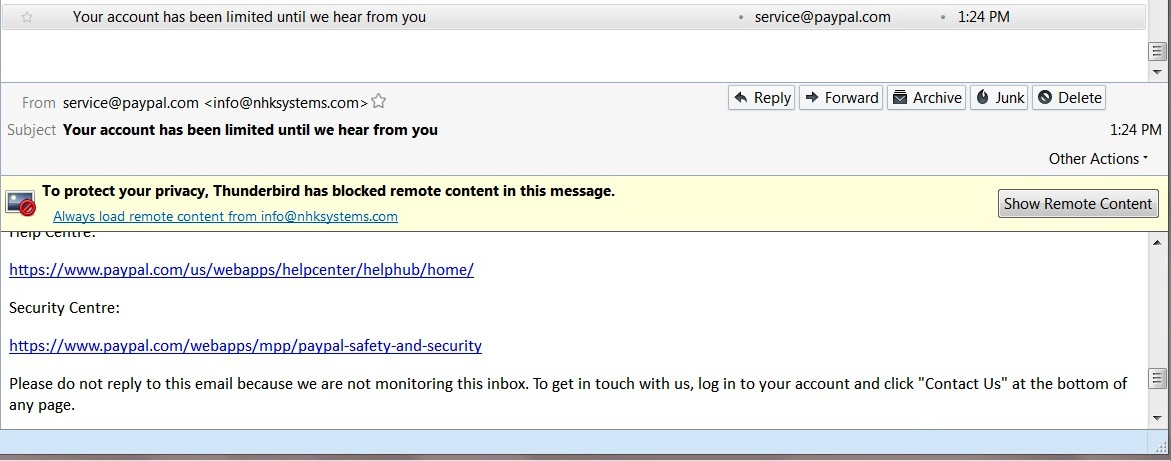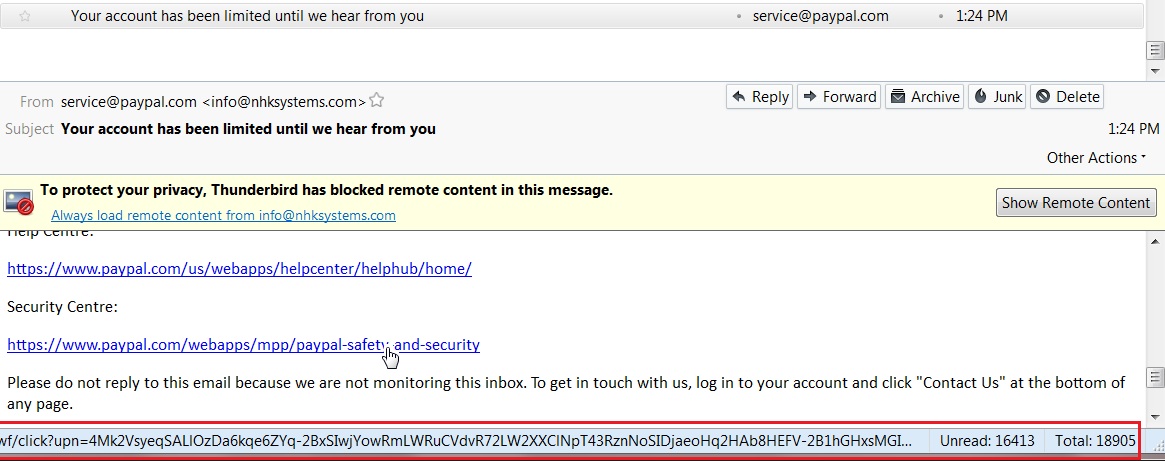We all get these miserable, time-wasting links by email every day from
most everywhere on the planet. For anyone who isn't web-savvy, clicking
on a bogus, virus or trojan creating link can mean disaster for your computer.
It's a given fact that everyone without exception needs a good,
regularly updated firewall program and anti-virus program. Free firewall
and anti-virus programs usually provide the value and protection equal
to what you paid for them: zero. Statistics today show every 2 MINUTES
a new virus, trojan, worm etc... is created. Many are self-replicating
and morphing. Remember this - when your computer is connected to the web,
it is silently having intercourse with thousands of web servers around
the world.
Protection programs may not filter bogus emails as they often are
clever enough to fool filters. Well crafted fake emails, like the one
shown below, look like a legitimate email from someone you may even be
doing business with. Such as Paypal, a credit card company or a bank:

click image for large view
In the above screen capture, at first it appears the email came
from Paypal. Note the light blue, blank bar along bottom of this email
program. We do see here the sender is nhksystems.com as shown in brackets.
That's your first clue something is very wrong here. "Centre" gives a
clue to a possible Canadian or European author. Americans spell it as
"center."
Next, hover your mouse over the URL in the window (DO NOT CLICK
ON IT!) See if the weblink to Paypal in blue matches the URL you would
be sent to. Email programs like Thunderbird and MS Express will usually
show you the real URL at the bottom of the email window in the blue bar
with a mouse hover:

click image for large view
When the mouse is hovered over the URL, notice how a DIFFERENT URL
appears at the bottom of the window (boxed in red.) A mouse hover test
proved that both links will open the same web page if clicked. This URL
clearly has nothing to do with Paypal. Sender even uses a dot-org, non-profit
suffix to try to make it look OK. Yet Paypal is a FOR-profit company.
Although most web users already know Paypal does not send out emails
like this, emails may appear to come from a well-known bank or other business.
That still does not indicate safety or authenticity. Another clue - this
email URL is not from a https:// link or a link to one, which is required
for a secure connection.
Scrambled text seen above probably contains Java code. This is a
short program embedded as part of the URL, which will probably mean on-going
trouble for you. It can be used for identity theft or create viruses,
Trojans, worms or other problems in your computer simply clicking on this
link. This can destroy your hard drive, motherboard and you'll probably
never know this caused it.
How can bugs like these destroy your motherboard? Viruses, Trojans,
worms etc... can wipe out the boot code. There exists a small program
in flash memory on every motherboard, whether it be a PC or Apple. It
is this program that always runs FIRST whenever you turn on your computer
or re-start it. Damaging it usually requires your motherboard to be replaced.
Since the chipset on your motherboard in PC computers is most almost certain
to be a different chipset on your dead motherboard, this forces a complete
re-install of your operating system. You can also have your hard drive
boot code wiped out, too. All your data files can be lost. All this damage
and expense just from innocently clicking on a email link!
Whenever you get emails like this, delete the email right away before
you or someone else in your family clicks on it. And follow the best rule
of thumb - never click on a link you if don't know what it is or asked
for it from someone you know. If it appears to come from your bank or
other institution you do business with and it remotely appears to be real,
use your telephone to find out!
Ted Twietmeyer |
![]()